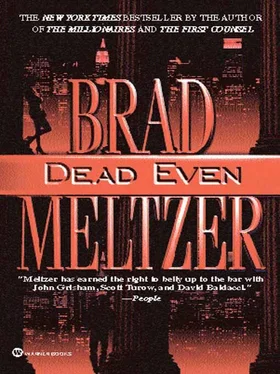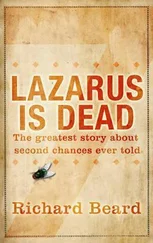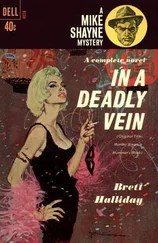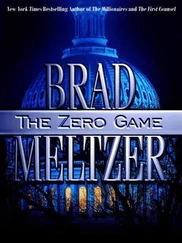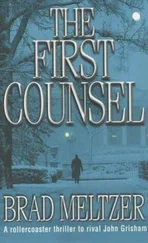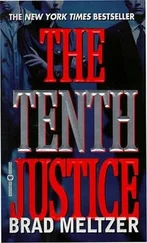“I’d never argue that with you,” Conrad said. “This is your case. And believe it or not, I appreciate the consequences.” Noticing the distant look in Sara’s eyes, he added, “I’m serious about that. It’s okay to be realistic.”
“Says the man who never settles.”
“Sara, not every case is a winner. Think about what you’ve faced: shaky witnesses, a shifty defendant, even your own husband. When it comes to emotional baggage, you’ve got more than a small piece of carry-on luggage here.”
“But this case-”
“I know you wanted this to be your breakthrough case, but you can’t make something from nothing. Well, sometimes you can, but now isn’t the time. When you get in there tomorrow, you’ll make your decision. And no matter what happens, you’ll live with the outcome.”
“It’s not the outcome that scares me, it’s the motivation behind it. You should’ve heard Jared last night – he did a guilt dance on my head that would’ve made my mother proud. And trust me, that’s saying something.”
“I believe it. Between the lack of witnesses and Victor breathing down your neck, you’ve got a ten-ton argument for washing your hands. You may not like dismissing it, but in this situation, it’s far better than losing.”
“I guess,” Sara said despondently. “Though it’s hard to see the difference.”
Rafferty reached across his sculptural leather sofa and answered the ringing phone.
“You said you wanted me to check in,” Kozlow said on the other end of the line.
“Have you forgotten how to say hello, or is that just a Neanderthal greeting?” Rafferty asked.
“Hello. How are you?” Kozlow growled. “Are we set for tomorrow?”
“We should be. Sara’s planning to subpoena both Claire and Patty at the crack of dawn.”
“Really? Are they going to be there to receive them?”
“Without a doubt,” Rafferty said. “Then when they give up nothing at the grand jury, we’re done with this nonsense.”
“Are you sure that’s the best way to do it?”
Rafferty refused to answer the question. “Where are you calling from?”
“Don’t worry,” Kozlow said. “It’s a pay phone. What do you think I am, stupid?”
“I’m not sure. Was it stupid to grab that diamond watch and the sterling silver golf ball?”
“Why do you have to keep bringing that up? I was-”
“I don’t want to hear it, you greedy little leech. If you’d never done that, we wouldn’t be in this situation.”
“What’d you call me?” Kozlow asked. “You think I’m greedy? Let me tell you something, you Kennedy-complex wanna-be, you were the one who-”
“Good-bye,” Rafferty interrupted. With a flick of his wrist, Kozlow was gone.
EARLY MONDAY MORNING, SARA PACED UP AND DOWN the dark, tiled hallways on the ninth floor of One Hogan Place, trying her best to look calm. Outside the grand jury room, a small line of assistant district attorneys was forming, all of them waiting for a chance to present their cases. Since the waiting room couldn’t accommodate everyone, the hallway was also filled with dozens of witnesses, family members, and defense attorneys. Sara stared intently at the ever-growing group, hoping to take her mind off her anxieties.
Lawyers in the crowd were easy to identify, with their navy-blue or gray single-breasted suits and stark white shirts. Anyone who wasn’t wearing the uniform was, by default, a witness, a victim, a defendant, or a family member there for moral support. To separate the ADAs from the defense attorneys, Sara needed only to read body language. The defense attorneys were relaxed and at ease. Since they were not allowed to participate in grand jury proceedings, they had nothing to lose. By comparison, the ADAs were usually younger, with a slight but noticeable tinge of nervousness in their eyes. A hand anxiously arched on a hip, bitten fingernails, a few too many glances at a watch – that was all it took to identify the prosecutors. That and their unmistakable attempts to look as calm as possible. The moment she realized the pattern, Sara stopped pacing.
Behind her, a man in a gray suit said, “I was hoping we’d be first, but I hear we’re seventh and eighth.”
Turning around, Sara recognized the man from her first day’s orientation. “Seventh and eighth?”
“To appear in front of the grand jury,” the man said. “Of the seventeen other ADAs who started with us, six have already done it. All got indictments but one. That guy Andrew from Brooklyn tanked it something fierce. My bet is he’ll be the first one to go. And rumor says layoff decisions are being made today.”
Sara raised an eyebrow at the news. “I’m sorry, what’s your name again?” she asked.
“Charles, but people call me Chuck.”
“Charles, Chuck, the both of you – do me one small favor? Don’t talk to me right now.”
The grand jury was selected once a month in a manner Guff called “the criminal justice version of bingo.” But unlike a traditional jury, which made a guilt determination in only one case, the grand jury usually heard dozens of cases each day and decided only whether there were reasonable grounds for the DA’s office to prosecute the case. Since the jurors served for a full month, the first Monday of the term usually meant a new grand jury – and the worst day to present a case. In the beginning of the term, the jurors were cautious novices, trying carefully not to indict the wrong man. By the end, they were jaded veterans, realizing that an indictment was only the first step of the process. In the beginning, they were nice people trying to do the right thing. By the end, they were average New Yorkers, ready to believe the worst about anyone.
Another twenty minutes went by before Sara heard Guff’s voice from down the hallway say, “Look who I found.” Turning around, she saw Guff wheeling a small metal cart that contained all of her files on the case – she was determined to be prepared for everything. Behind him came Officer McCabe, Claire Doniger, and Patty Harrison. McCabe looked calm, Doniger looked annoyed, and Harrison looked terrified. As she approached her witnesses, Sara said, “I hope you understand why we had to-”
“Don’t treat me like a child,” Doniger blurted, her tinted salon-styled hair bouncing with a life of its own. With her Adolfo suit, bottled tan, obvious face-lift, and tiny purse, the fifty-four-year-old Doniger looked exactly as Sara had imagined. When Doniger walked right past her, Sara realized their conversation was over.
Turning toward Harrison, Sara lightly touched her shoulder. “Are you all right?”
“Yeah,” Harrison said unconvincingly.
“Do you want to tell me who threatened you?”
“Nobody threatened me,” Harrison insisted. Her jet-black hair was pulled back and clipped with a black velvet bow, and her ice-blue eyes danced as she spoke. “But I’m telling you one thing: I will not become a leper in my own neighborhood.”
“Who’s making you feel like a leper? Ms. Doniger? Kozlow?”
“I don’t even know who that man Kozlow is. I saw him that one night leaving Claire’s house. He looked shady, so I made a phone call. That’s all I know.”
“And that’s all I need you to say. Just tell the story.”
Harrison turned away. “No. I’m not doing it.”
“It’s your duty to do it.”
“I don’t have a duty to anyone except myself. My husband left me eight years ago for his big-haired personal assistant; my daughter moved out to San Francisco and I never hear from her, and the highlight of my week is flirting with the meat guy at the deli counter in the supermarket. It may be pathetic, but it’s my life, and I enjoy it. And I’m not giving it up for some mythical sense of duty.” When Harrison noticed some of the other people in the hallway staring at her, she turned to them and yelled, “Mind your own damn business, you nosy twits.”
Читать дальше
